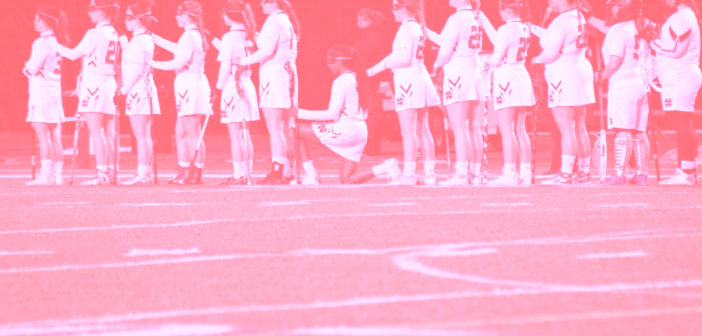A woman kneels at her first lacrosse game because she wants others to understand the African-American experience on her college campus and the experience of those who have faced injustice because of racism. A man raises his fist in the air as a sign that he and his people are here to show others that prejudice and discrimination do not affect their progress.
Both are powerful, and both are Black Positivism.
But what exactly is Black Positivism?
Nancy Musinguzi, a photojournalist and social media activist, says that it was “grown from the post-Black Power movement in the late ’60s, and has continued to evolve not just in our politics, but entertainment, television, cinema, education and other areas that shape culture.”
But this doesn’t answer the question of what Black Positivism is. Encyclopaedia Britannica describes the philosophical term, “positivism,” as a form of enlightenment or knowledge through study and examination.
Simply put, Black Positivism is the understanding of one’s own Blackness through the study and examination of other African -American representation and success. However, this enlightenment is rooted in both mental and physical positivity.
Strong social awareness and an understanding of socialization within a culture raise the likelihood of having a high self-esteem, according to a 2015 study in the Journal of Primary Prevention.
The study also explains that minorities that participate in “a variety of activities designed to promote positive development in a warm, supportive, entertaining group experience” can then become more confident about their own identities.
The Black Student Association on North Central’s campus does just that, according to Mynk Richardson-Clerk, ’20.
“They understand being a student of color on a predominantly white campus. There are just so many things that I don’t have to explain because they just get it already,” she said.
Self-esteem plays a role in how African-Americans perceive themselves, and in today’s world, representation is even more necessary. With more and more black artists becoming mainstream, the increased amount of melanated people using social media positively, and the winter 2018 release of the film “Black Panther,” Black Positivism is making its way back into the limelight.
Richardson-Clerk goes on to explain how ever-growing black success is integral to furthering positivism onto African American youth: “It helps with bringing in that intersectional quality into black culture which I think is really great for (media). It gives the youth people to look up to and understand that their experiences are shared and valid.”
The 2015 study agrees that “…cultural pride messages are associated with positive youth academic and cognitive outcomes.”
In other words, black children who intake more positive information about people who look and behave like them will view themselves more positively. Musinguzi affirms this as well.
“I think we’re seeing more of that now in how Blackness is represented on screen, finally seeing narratives we can relate to beyond the static framing of oppression, poverty and violence that limits understandings of a culture,” she said.
Online, young African-Americans can visit websites that promote Black Positivism, like Afropunk, or engage in hashtag activism like #BlackGirlMagic, #melanin and #afro. They now have tools to expand their knowledge of current black culture. Musinguzi shared her take on how websites and social media pages aid modern Black Positivism:
So much of our identity is rooted in this thing called cultural memory, how we remember ourselves based on what is left behind for the world to interpret and reflect back into everyday reality… today’s Black Positivism movement is led by those marginal from spaces of decision-making and influence, rooted in those same principles that challenge conventional knowledge about Black culture.
Black culture is evolving because of the online presence of black empowerment. Take for instance, the hashtag #BlackGirlMagic. Julee Wilson from Huffington Post describes it as “a term used to illustrate the universal awesomeness of black women. It’s about celebrating anything we deem particularly dope, inspiring, or mind-blowing about ourselves.”
This hashtag can be found all over Instagram and Twitter, with millions of users tagging it onto their posts. Richardson-Clerk is one of them. She says that using it is an important way to “take care of our young black girls because no one else is gonna do it.”
Online images that promote the beauty and can subvertly eroticize black skin is very helpful for young black women in this society, according to Musinguzi. These types of influences can and will continue to move toward “a more inclusive movement that is holistic in the way it celebrates and embraces the multifacetedness of Blackness.”

